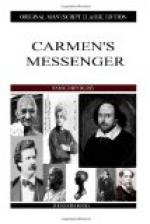“I wanted to see if a man I know is staying here,” he told the clerk.
“That’s all right,” said the other. “Quite a number of people have been looking for friends to-day.”
Foster described Daly as well as he could, and asked if he had examined the book.
“No,” said the clerk. “Nobody just like that had the register while I’ve been about; but now I think of it, a man who might meet the bill stood by while another looked at the last page.” Then he indicated a figure near the revolving door, “There! that’s who he was with!”
As the man pushed the door round Foster saw his face, and knew him for the stranger who had occupied the chair in which he had expected to find Daly. He thanked the clerk and went back thoughtfully to his place, because it looked as if Daly had been there and the other had helped him to steal away. If this surmise was correct, they might be trying to follow Featherstone; but he was, fortunately, out of their reach, and Foster decided that he must not exaggerate the importance of the matter. After all, Daly might have come to Montreal on business, and the rotunda of a Canadian hotel is something of a public resort. Still, he felt disturbed and presently gave the clerk the fur coat, telling him to deliver it when asked for. He felt it a relief to get rid of the thing.
Next day he sailed on an Empress liner, and on the evening after he reached England left the train at a lonely station in the North. It was not yet dark, and for a moment or two he stood on the platform looking about. There had been rain, and the air had a damp freshness that was unusual in Canada. In the east and north the sky was covered with leaden cloud, against which rounded hilltops were faintly marked. Rugged moors rolled in long slopes towards the west, where the horizon was flushed with vivid saffron and delicate green. Up the middle of the foreground ran a deep valley, with blue shadow in its bottom and touches of orange light on its heathy sides. There were few trees, although a line of black firs ran boldly to the crest of a neighboring rise, and stone dykes were more common than the ragged hedges. Foster saw no plowed land, and nothing except heather seemed to grow on the peaty soil, which looked black as jet where the railway cutting pierced it. Indeed, he thought the landscape as savage and desolate as any he had seen in Canada, but as he did not like tame country this had a certain charm.
While he looked about a man came up. He was elderly and dressed with extreme neatness in old-fashioned dark clothes, but he had the unmistakable look of a gentleman’s servant. Though there was a small car in the road, he was obviously not a professional chauffeur.
“You’ll be Mr. Foster, sir, for the Garth?” he said.
Foster said he was and the man resumed: “Mr. Featherstone sent the car and his apologies. He had to attend the court, being a magistrate, and hoped you would excuse his not coming.”




